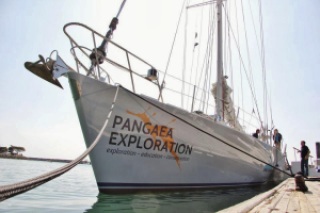The Caribbean wasn’t supposed to be like this. This sea is known for being calm and pleasant, but that’s not how I feel during my first watch on our transit from St. John to Martinique.
Sea Dragon crawls up what seem to be mountains of water and crashes down on the other side, filling the air with spray. The wind is blowing at a sustained 30 knots, with frequent squalls of up to 48 knots. At these speeds the wave tops blow off in smoky wisps. Spray shrouds the surface of the water and the visibility is no better than in a fog. Raindrops blown by the wind feel like they are burrowing into my skin. After each wave soaks the deck, the water trickling into my mouth is ferociously salty but gradually sweetens as the rainwater dilutes it. The mainsail is now triple reefed—folded much smaller than its full size so it can carry us through the strong winds without overpowering the boat.
 |
| Sea Dragon in calmer waters. Photo courtesy of Pangaea Exploration |
At times the helmsman wears goggles to see in the spray. I slither across the precipitous deck always keeping three points of contact. Huddled behind the wheel as the leader of my watch mans the helm, I’m not sure how much help I am. I remember that this boat can roll so that its mast is in the water and still right itself, and I understand what my watch leader meant when he said that the boat is able to sail much harder than the crew are willing to endure.
My 4-8:00 a.m. watch feels interminable and my fingertips begin to resemble brain corals somewhere in the early morning, but then the sun rises, not that I can see it through the thick clouds. Even so, the light brightens my mood and although there are still two hours in my watch, I know I will be fine.
We are on the first transit of the expedition, a 300-mile voyage and are sailing heeled over 30 degrees on a port-tack into the wind. Life at an angle is a new experience—you must plan each step and maneuver, timing it with the irregular pitch of the boat and making sure you are sufficiently braced. When it’s my turn to cook dinner, I abandon my grand plans of baking bread and making a cabbage salad and instead opt for chili. Opening cans of vegetables is much easier. Still, the stove poses some challenges. It swings freely so pots are always upright, but that means the knobs are moving targets. I finally get it adjusted right and the chili tastes quite good, although no one has much of an appetite.
The next two days are a blur of wet people moving around a boat that has become muggy, damp, slimy, and salty. No one talks much. There isn’t much to do but endure the watches and lie in your bunk. I read a bit, but bringing out a computer, let alone washing the salt off of my body, is completely out of the question.
Eventually I do adjust to this new way of life, and I am steering the boat when the steep, otherworldly silhouette of Martinique appears, signaling the end of our crossing.


























